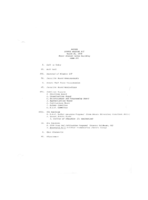Search the Special Collections and Archives Portal
Search Results
Irving Hirshon Photographs
Identifier
Abstract
The Irving Hirshon Photographs are comprised of 55 color slide photographs taken by Irving Hirshon in 1971 of Lake Mead, Hoover Dam, downtown Las Vegas, and the Las Vegas Strip. Hirshon is believed to have taken the slides in the summer of 1971 on a West Coast trip to celebrate his twenty-fifth wedding anniversary.
Archival Collection
Gilbert Buck Papers
Identifier
Abstract
The Gilbert Buck Papers (1930-1986) focus on Buck's work as a surveyor and real estate broker in southern and central Nevada. Included are master reports, designs, standards, flood and drainage reports, and land specifications on water, sewer, and public lands. Papers regarding real estate include reports, housing and mobile home development plans, newsletters, surveys, and Buck Realty negotiations. There are books and information on seminars Gilbert Buck hosted in Las Vegas, Nevada on investing in raw land. Also included are awards, correspondence, newsletters, a scrapbook of Buck's early life, and information on his campaign for governor of the state of Nevada in 1974. There is include some documentation of Buck's real estate and mining interests in South America.
Archival Collection
Chip Johnson Collection of Hoover Dam Photographs
Identifier
Abstract
The Chip Johnson Collection of Hoover Dam Photographs (approximately 1930-1936) consist of sixteen black-and-white photographs that depict the construction of Hoover Dam and the surrounding area. The photographs were taken by an unknown photographer.
Archival Collection
Earl Rockwell Papers
Identifier
Abstract
The Earl Rockwell Papers (1852-1978) consists of newspaper clippings, diaries, books, correspondence, and ephemera related to Las Vegas, Nevada pioneer Earl Rockwell. The collection documents Rockwell’s life in Las Vegas and Elmira, New York and also contains seven nineteenth-century diaries that belonged to Rockwell’s grandmother, Amanda Brees.
Archival Collection

Alpha Kappa Alpha Sorority, Theta Theta Omega Chapter meeting minutes (redacted)
Date
Archival Collection
Description
From the Alpha Kappa Alpha Sorority, Incorporated, Theta Theta Omega Chapter Records (MS-01014) -- Chapter records file.
Text

Dr. Javier A. Rodríguez oral history interview: transcript
Date
Archival Collection
Description
Oral history interview with Dr. Javier A. Rodríguez conducted by Elsa Lopez and Barbara Tabach on December 19, 2019 for the Latinx Voices of Southern Nevada Oral History Project. Dr. Javier Rodríguez, Biology Professor at the University of Nevada Las Vegas, talks of his personal and educational history that led him to UNLV. He discusses his migration from Puerto Rico to California where he received his PhD from the University of California Berkley and became a biological museum curator for various animal specimens. He later moved to Las Vegas to teach at UNLV where he has now been for nearly two decades; Dr. Rodríguez shares how UNLV has changed since he first started working here, including the university's increased interest in faculty research to become a Top Tier institution. Subjects discussed include: Puerto Rico; University of California Berkley; University funding; Tier 1 research institutions.
Text

Meeting minutes for Consolidated Student Senate, University of Nevada, Las Vegas, March 20, 1979
Date
Archival Collection
Description
Text
Eric Brown (Washoe, County Manager) oral history interview conducted by Kelliann Beavers: transcript
Date
Archival Collection
Description
From the Lincy Institute "Perspectives from the COVID-19 Pandemic" Oral History Project (MS-01178) -- Government agency interviews file.
Text

Transcript of interview with Brian Cram by Stefani Evans and Claytee White, October 28, 2016
Date
Archival Collection
Description
Throughout his career, former Clark County School District Superintendent (1989–2000) Brian Cram took his father's words to heart. He heard them repeatedly over the years as he watched and later, helped, his father clean classrooms at Robert E. Lake Elementary School: this place—the classroom—this is the most important place. Cram was born in Caliente, where his father worked on the railroad. In 1939, when Cram was a toddler, the family moved to Las Vegas and his father found work first as a sanitation engineer at a hospital, and then at CCSD as a custodian. The elder Cram, who spent his formative years in the Great Depression, prided himself on doing "good, honorable work" as a custodian, because the work—the classroom—mattered. Even so, he wanted more for his son. Cram largely ignored his father's advice during his four years at Las Vegas High School, where he ran with The Trimmers car club, wore a duck tail and a leather jacket, and copped an attitude. Cram's swagger, though, d
Text

Transcript of interview with Marcy and Jack Simon by Barbara Tabach, May 16, 2018
Date
Archival Collection
Description
It was 1964 when Jack Simon met Marcy Stiel at a mutual friend’s wedding. Smitten from the beginning, the couple married shortly thereafter. Thus began their loving partnership that has flourished in business, community involvement, and most importantly in raising their two sons, Ron and Steven. The Simon’s can be a modest power couple. However, they are clearly capable of making things happen. When they first married, Jack was a California electrical contractor and homebuilder and Marcy became his business administrator. The Simons through their Electrical Company, Expo-Tech Electrical & Plumbing Services, Inc. won the contract to provide all of the electrical services for the entire 1984 Los Angeles Olympics, encompassing (26) twenty six venues located in California spanning from San Diego to Stanford University. The trajectory of the business was extraordinary, establishing twelve offices nationwide to provide temporary electrical and plumbing services for conventions and special events. Expo-Tech was eventually bought by industry giant GES. Their success was due in large part to Jack’s technical knowledge and Marcy’s administrative and marketing skills. With entrepreneurial zest, and over the period of eleven years, the couple found their way into the ownership of four local casinos in Elko and Wendover Nevada. Marcy was one of the first women in Nevada to hold multiple gaming licenses. In total, she held four Unrestricted Gaming Licenses. The Simons hosted Passover Seders for the Elko Jewish Community during their ownership of the casinos. In 2004, Marcy and Jack sold the four casino operations. Since moving to Nevada in 1994, the couple has made a warm and lasting impression, being generous in their focus for the well-being of the Jewish community. They are among those that actively paved the way for SB26, which outlaws government bodies from conducting business with companies that boycott Israel. They continue to be tireless advocates and philanthropists in Jewish organizations of Las Vegas and Nevada.
Text
